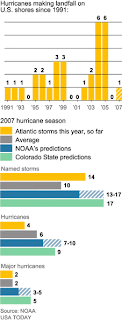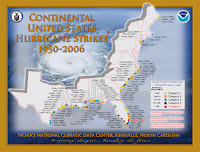[x-posted on The 2 Dollar Bill]
On Tuesday, the National Oceanic and Atmospheric Administration released findings that an increase in ocean temperature in the Atlantic Ocean, among others, would likely lead to FEWER landfalling hurricanes in the United States. [For recent trends, see the USA TODAY graphic on the left].
“We looked at U.S. landfalling hurricanes because it is the most reliable Atlantic hurricane measurement over the long term,” says Chunzai Wang, a physical oceanographer and climate scientist with NOAA’s Atlantic Oceanographic and Meteorological Laboratory in Miami and lead author on the article. “Using data extending back to the middle nineteenth century, we found a gentle decrease in the trend of U.S. landfalling hurricanes when the global ocean is warmed up. This trend coincides with an increase in vertical wind shear over the tropical North Atlantic and the Gulf of Mexico, which could result in fewer U.S. landfalling hurricanes.” For the article, Wang worked with Sang-Ki Lee of the Cooperative Institute for Marine and Atmospheric Studies-University of Miami.
In terms of hurricane strength, Wang notes, “The vertical wind shear is not the only factor affecting Atlantic hurricane activity, although it is an important one.” Other factors include atmospheric humidity, sea level pressure, and sea surface temperature.This study also suggests that where the global ocean warming occurs is important for determining the vertical wind shear in the Atlantic hurricane main development region — within the 10°-20° North latitude belt that stretches from west Africa to Central America. Whether future global warming increases Atlantic hurricane activity will probably depend on the relative role induced by sustained long-term warming over the tropical oceans.
Observations from 1854 to 2006 show a warming of sea surface temperature occurring almost everywhere over the global ocean, with large warming in tropical regions of the Pacific, Atlantic, and Indian oceans. Warmer waters in the tropical Pacific, Indian and North Atlantic oceans produce opposite effects upon vertical wind shear; that is, warming in the tropical Pacific and Indian oceans increase vertical wind shear in the Atlantic hurricane main development region, while warming in the tropical North Atlantic decreases vertical wind shear. Overall, warming in the Pacific and Indian oceans is of greater impact and produces increased levels of vertical wind shear which suppresses Atlantic hurricane activity.
In order for a hurricane to form, three basic properties need to exist in the atmosphere:
- Warm, deep water. At least 200' deep, 80º F or greater.
- Warm, unstable air.
- Low, or little wind shear. That means a general wind flow at low, mid and high levels of the atmosphere will little to no change in direction or speed.
 In this case, it sounds as if the increased wind shear will be the downfall of landfalling hurricanes.
In this case, it sounds as if the increased wind shear will be the downfall of landfalling hurricanes.What clearly jumped out at me was the term landfalling. As I like to say during reports... you can have 10 Category Fives lurking over Davey Jones' locker, but if they don't make landfall, who gives a rip?
But for those of us who reside stateside, a rising global ocean temperature, specifically in the above named basins, may mean fewer landfalling tropical cyclones. And with the recent explosion in coastal population, that's certainly a good thing for insurance rates.
The flip side, and in my mind... more importantly... it means a major redistribution in fresh water for the Southern and Southeastern United States. In other words, I'd assume that fewer landfalling tropical cyclones means fewers instances of widespread, heavy precipitation events that allow reservoirs to fill, crops to grow and communities to survive. I.e. more drought in the Southeast.
 I've mentioned before that one of the best basic weather books on the market is The Weather Book by Jack Williams. Online weather understanding tools at USA Today are equally awesome:
I've mentioned before that one of the best basic weather books on the market is The Weather Book by Jack Williams. Online weather understanding tools at USA Today are equally awesome:How a hurricane forms (flash animation)
Deadliest hurricanes since 1492
National Hurricane Center Hurricane Archive
and most important to this story....
How wind shear rips apart a hurricane














